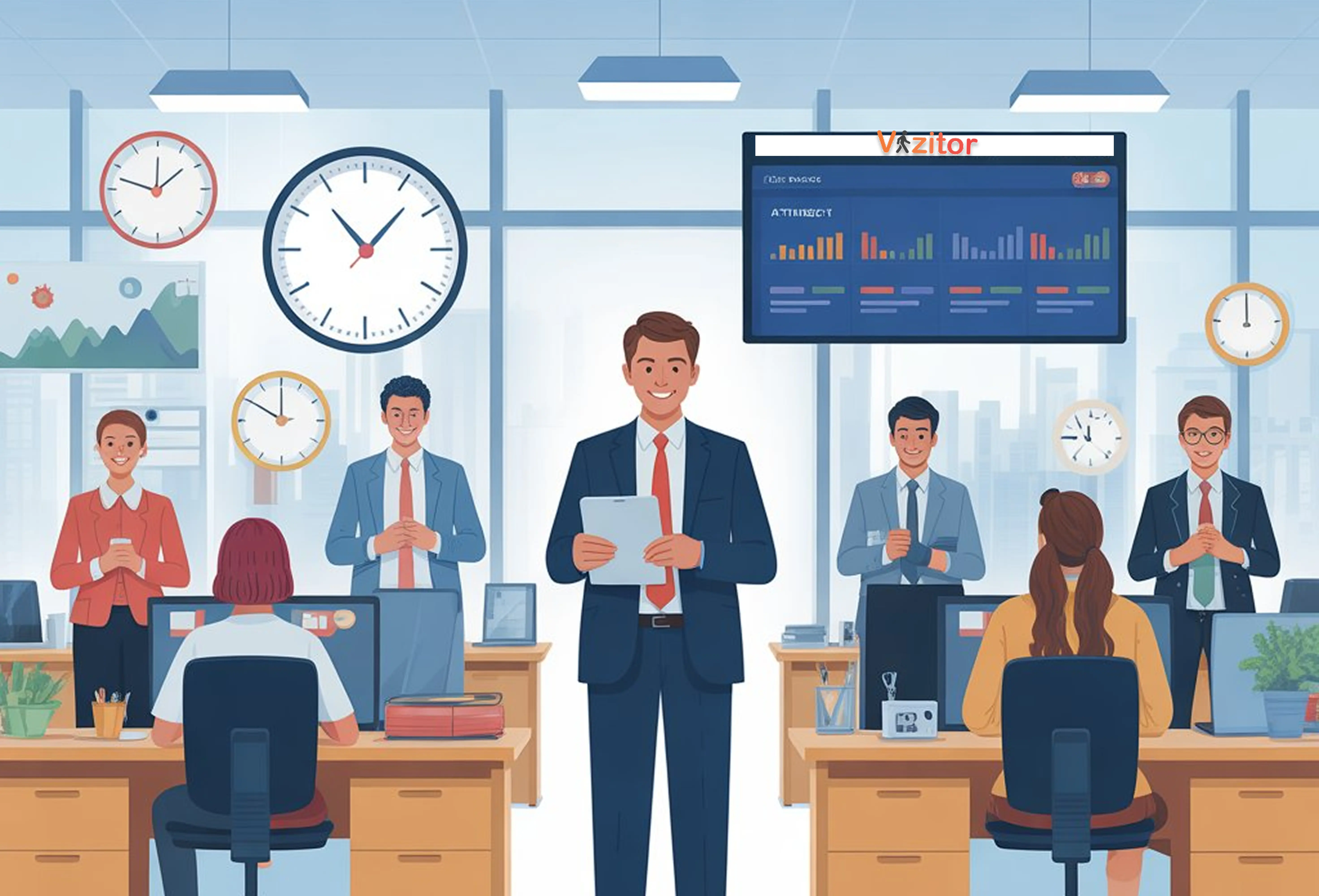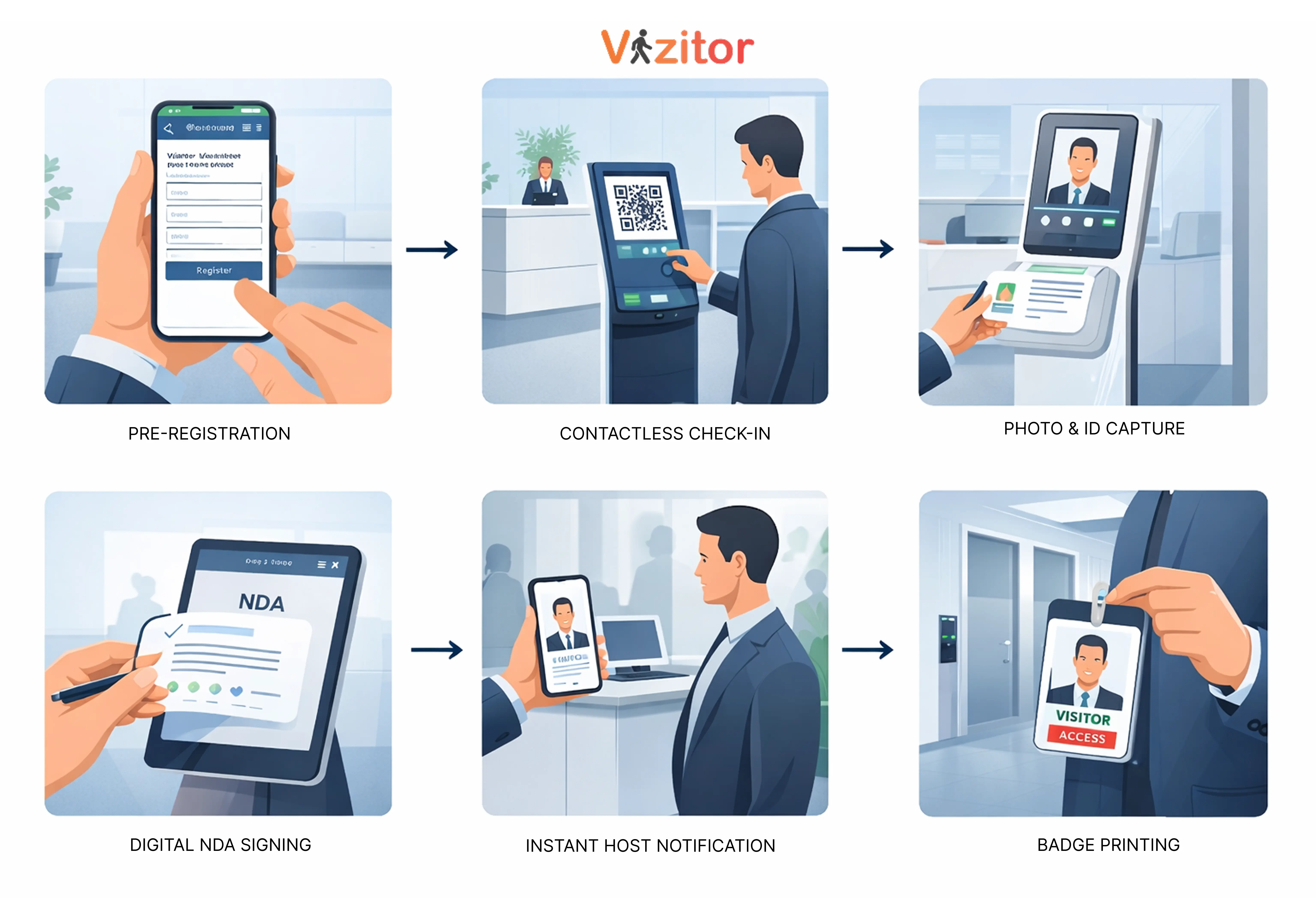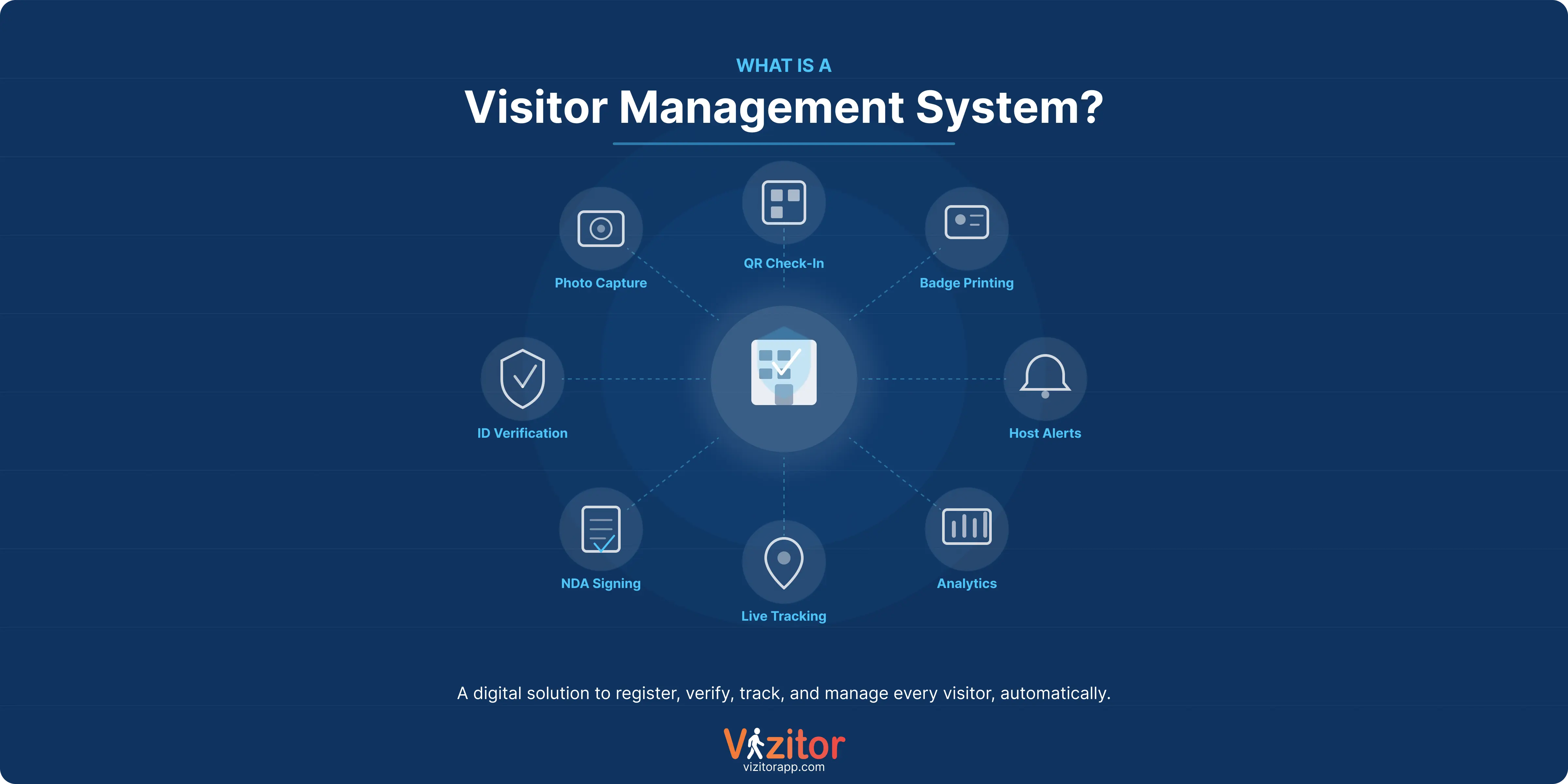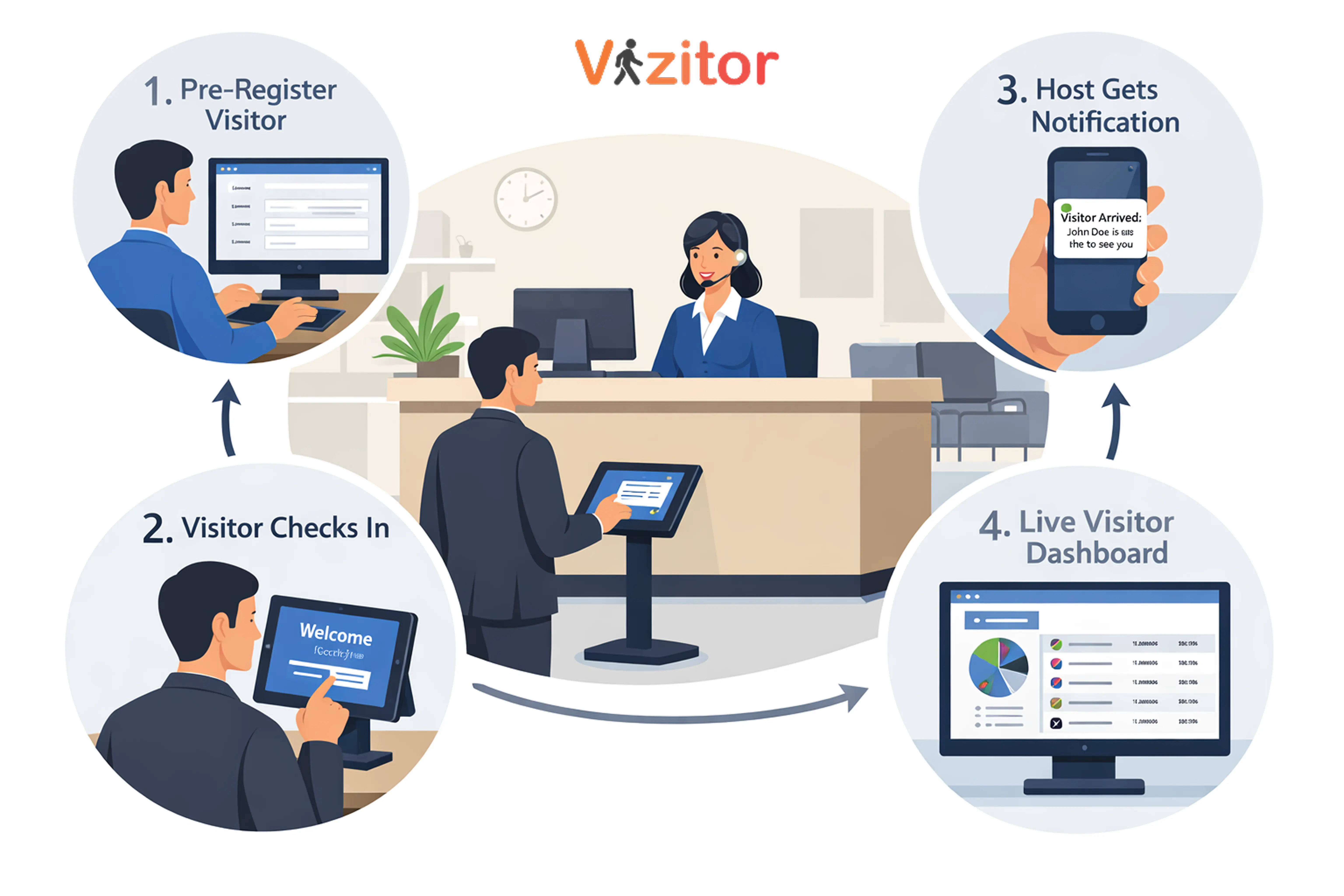How to Improve Punctuality in the Workplace | Tips & Strategies
This blog explores how to improve punctuality in the workplace, highlighting why timeliness matters for productivity, professionalism, and team morale. It covers common reasons for lateness, practical strategies for employees, actionable tips for managers, and the role of digital attendance systems and VMS solutions in fostering a culture of punctuality. Readers will learn how to create a more efficient, reliable, and respectful work environment through better time management and workplace practices.

Table of Content
Try Vizitor for Free!

Published on: Wed, Feb 10, 2021
Last updated: 2025-09-23
Read in 5 minutes
Introduction
Punctuality isn’t just about showing up on time, it reflects professionalism, reliability, and respect for others’ time. In modern workplaces, where collaboration and deadlines are critical, timely attendance plays a crucial role in overall productivity and team morale.
Yet, lateness is a common challenge. From traffic delays to poor time management, employees face multiple hurdles in staying punctual. For organizations, consistent tardiness can disrupt operations, delay projects, and impact workplace culture.
This blog explores practical strategies for employees, tips for managers, and how technology like Vizitor’s Attendance Management System can foster a culture of punctuality, streamline attendance, and ensure a professional work environment.
Why Punctuality Matters in the Workplace
- Boosts Productivity
Employees who arrive on time ensure projects start promptly and deadlines are met. Consistent punctuality reduces workflow disruptions, allowing teams to work efficiently. - Enhances Professional Reputation
Being punctual demonstrates responsibility and reliability, which can lead to recognition, promotions, and trust within the team. - Strengthens Team Morale
When everyone values time, collaboration becomes smoother, and frustration from repeated delays decreases. - Supports Organizational Goals
Timely attendance ensures smooth operations across departments and helps organizations meet client expectations, deadlines, and operational targets.
Common Reasons Employees Are Late
Understanding why employees struggle with punctuality is the first step in solving the problem:
- Poor Time Management: Underestimating task durations or failing to plan ahead.
- Commute Issues: Traffic jams, public transport delays, or parking problems.
- Low Motivation or Engagement: Disconnected employees may struggle with timeliness.
- Health and Lifestyle: Sleep deprivation, stress, or family responsibilities.
- Inefficient Workplace Processes: Long morning routines or delayed meetings.
Employee Strategies to Improve Punctuality
1. Plan Your Day the Night Before
Organize tasks, outfits, and commuting plans to reduce morning stress and ensure a smooth start.
2. Set Alarms and Reminders
Use digital calendars or phone alarms to stay on schedule. Multiple reminders can prevent accidental oversleeping or missed meetings.
3. Prioritize Sleep and Health
A consistent sleep routine, healthy meals, and regular exercise can improve alertness and reduce tardiness.
4. Estimate Travel Time Accurately
Factor in traffic, weather, and parking. Tools like Google Maps help anticipate delays and adjust departure times.
5. Use Time-Tracking Tools
Apps like Trello, Asana, or Clockify help employees track tasks and deadlines, promoting better time management.
6. Adopt a Punctual Mindset
Treat punctuality as a habit and professional responsibility, not just a rule to follow.
Manager Strategies to Encourage Punctuality
1. Lead by Example
Managers who arrive on time set the standard for the entire team.
2. Communicate Clear Expectations
Clearly define start times, meeting schedules, and deadlines to eliminate confusion.
3. Implement Attendance Tracking
Digital tools like Vizitor or other employee attendance software can monitor punctuality objectively and fairly.
4. Reward Timeliness
Recognize employees who consistently arrive on time with praise or incentives to reinforce good habits.
5. Address Lateness Constructively
Identify the root causes of lateness and provide support such as flexible hours, time management training, or workflow adjustments.
6. Offer Flexible Scheduling
When feasible, staggered start times or hybrid work options can reduce commute stress and improve punctuality without affecting productivity.
Role of Technology in Improving Punctuality
1. Digital Attendance Tools
Automated systems record clock-ins and clock-outs, reduce disputes, and promote accountability.
2. Visitor Management System (VMS)
For workplaces with visitors, a Visitor Management System like Vizitor ensures smooth check-ins, prevents delays at reception, and helps monitor employee attendance alongside visitor flow.
3. Reminders and Notifications
Calendar alerts, project management tools, and automated notifications help employees stay on track throughout the day.
Creating a Punctuality-Friendly Workplace Culture
- Start Meetings on Time: Avoid delaying for latecomers to emphasize the value of everyone’s time.
- Encourage Accountability: Promote personal responsibility for schedules and deadlines.
- Flexible Work Policies: Consider remote or flexible work options to reduce tardiness stress.
- Training & Workshops: Conduct sessions on time management, productivity, and stress management.
Mistakes That Hurt Workplace Punctuality
- Ignoring minor delays that accumulate over time.
- Not tracking attendance or lateness patterns.
- Using punitive measures without addressing root causes.
- Overlooking remote or hybrid employees’ time management challenges.
Avoiding these mistakes ensures sustainable improvements in punctuality.
Measuring Punctuality Effectiveness
- Track employee attendance data over weeks and months.
- Monitor meeting start times and project deadlines.
- Collect feedback to understand challenges and barriers.
- Celebrate improvements and refine policies to sustain punctuality.
Conclusion
Improving punctuality is a shared responsibility. Employees benefit from better time management habits, while managers must cultivate a supportive environment that values timeliness. With practical strategies, supportive culture, and technology like Vizitor, organizations can enhance productivity, teamwork, and professional reliability.
Punctuality isn’t just about being on time, it’s about respecting others, valuing your own time, and building a professional workplace culture.
Ready to boost punctuality and streamline workplace attendance?
Try Vizitor today to simplify check-ins, track employee arrivals, and create a more organized, productive work environment. [](https://www.vizitorapp.com/contact/)
Book a free demo now and take the first step toward a punctual, efficient workplace.
FAQs
Q1: How can employees improve punctuality?
Plan your day ahead, use reminders, track tasks, and maintain healthy routines.
Q2: How can managers foster punctuality?
Lead by example, communicate expectations, track attendance, and reward timely behavior.
Q3: How does Vizitor help punctuality?
It streamlines visitor check-ins, tracks employee attendance, and reduces delays at reception.
Q4: Why is punctuality important at work?
It boosts productivity, team morale, professional reputation, and organizational efficiency.









